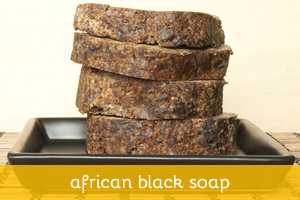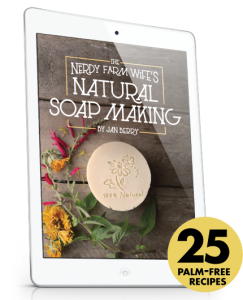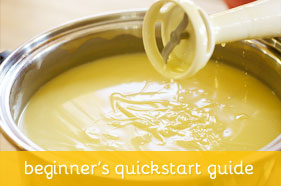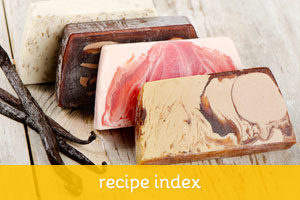African black soap, also known as Anago Soap, Alata Simena or Ose Dudu, is a traditional, rough looking soap handmade by several west african tribes. it has been used for centuries to naturally treat various skin conditions such as acne, oily skin, eczema, rashes and hyper-pigmented or blemished skins.
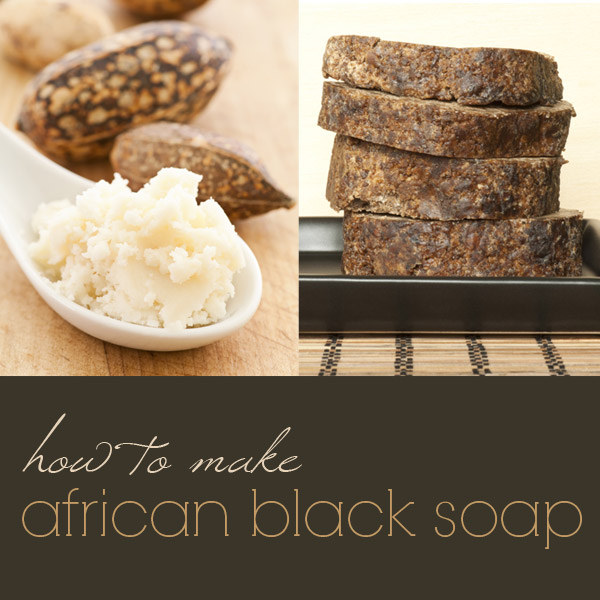
There isn’t an “official” recipe for black african soap, because the tribes use whatever is available where they are and it changes from area to area. The exact recipes from each tribe are closely guarded secrets passed from generation to generation.
It’s widely believed that most recipes include roasted plantain skins, cocoa pods (the shells of the cocoa fruit) and, most often than not, also palm tree leaves, shea tree bark and unrefined shea butter.
Traditionally, the plantain skins, cocoa pods and other ingredients are sun dried and than carefully baked in clay ovens. The ash from all that burnt plant material is the source of lye. When mixed with vegetable oils — such as coconut oil, palm kernel oil and palm oil — it saponifies and becomes a soft, malleable soap.
There are tons of imitation black soaps on the market. Although they claim to be true African Black Soap, they are nothing but vegetable based soaps that have been dyed black. Real african black soap is soft and malleable, while fake black soap is hard. It does not contain any traditional ingredients. Instead, it is loaded with cheap, chemically processed vegetable oil and stains your wash cloth.
Unfortunately, without the closely guarded knowledge from those tribes, it’s not possible for us to make real african black soap. But we can try and make a reasonable approximation that, while not the real thing, will still be pretty great soap.
Cold Process African Black Soap
I researched several recipes before I found this video by a woman named Roberta. It’s not exactly a recipe because she doesn’t list the specific oils she used. She says in the comments that you can use you favorite cold process recipe. This is what her soap looks like when finished:
Cold Process African Black Soap
We know traditional black soap is made with a combination of coconut oil, palm kernel oil, palm oil and plenty of raw unrefined shea butter (at least 45 percent of the oils, according to this book) — so that is what I would use.
The secret of this soap is what Roberta calls “African Black Soap Mixture”. it’s actually a product called 100% Pure African Black Soap by Shea Terra. It’s a raw powder made from cocoa pod ash, plantain peel ash, locally produced palm kernel oil and camwood bark, with nothing else added to it. You can buy it from Amazon here:
Black African Soap Mixture Available on Amazon
Here’s the video explaining how to make this soap:
I haven’t tried to make this soap yet because I can’t get the key ingredient in my country. But when I’m able to get my hands on it, this is what I’m going to try:
- 55% unrefined shea butter
- 15% palm kernel oil
- 15% palm oil
- 15% coconut oil
So to make 1 pound of soap (5% superfat), soapcalc gives me the following:
- 8.8 oz shea butter
- 2.4 oz palm kernel oil
- 2.4 oz palm oil
- 2.4 oz coconut oil
- 2.21 oz lye (NaOH)
- 6.08 oz water
And the key ingredient:
- 1 or 2 tsp of African Black Soap mixture by Shea Terra*
*I have no idea how much to use, so I’ll just set apart a little bit of melted oils and add one teaspoon of this mixture at a time until I get a similar color and consistency of the mixture Roberta uses on her video.
I can’t stress this enough: I haven’t made this recipe yet so I don’t know if it will work. If you want to try it anyway, you are free to do it on your own risk — just please run it through a lye calculator first and see if you want to adjust anything. And let me know how it turns out!
Other African Black Soap Recipes You Can Try
Hot Process African Black Soap
Not a fan of trying an untested recipe by yourself? Or maybe you would like a rougher, more “primitive” looking soap, similar to the traditional african soaps? No problem! There are a couple other recipes you can make:
Crockpot African Inspired Soap
by Soaping 101
- 6 oz palm kernel oil
- 3 oz unrefined shea butter
- 3 oz unrefined cocoa butter
- 4.5 oz rainwater
- 1.9 oz lye
Hot Process “African” Black Soap
by Erica Pence (from Bonnie Bath Co)
- Handful of cocoa pods
- 3 pieces of shea tree bark
- Skin of one plantain
- 1 cup palm oil
- 3/4 cup unrefined shea butter
- Fragrance or Essential Oils
For this recipe you don’t need commercial bought lye. You get the lye-water when you mix the ashes formed from roasting the cocoa pods, the shea bark and the plantain skin. It’s pretty much the same process our forefathers used when making lye from hardwood ash. See directions and notes over at her post.

